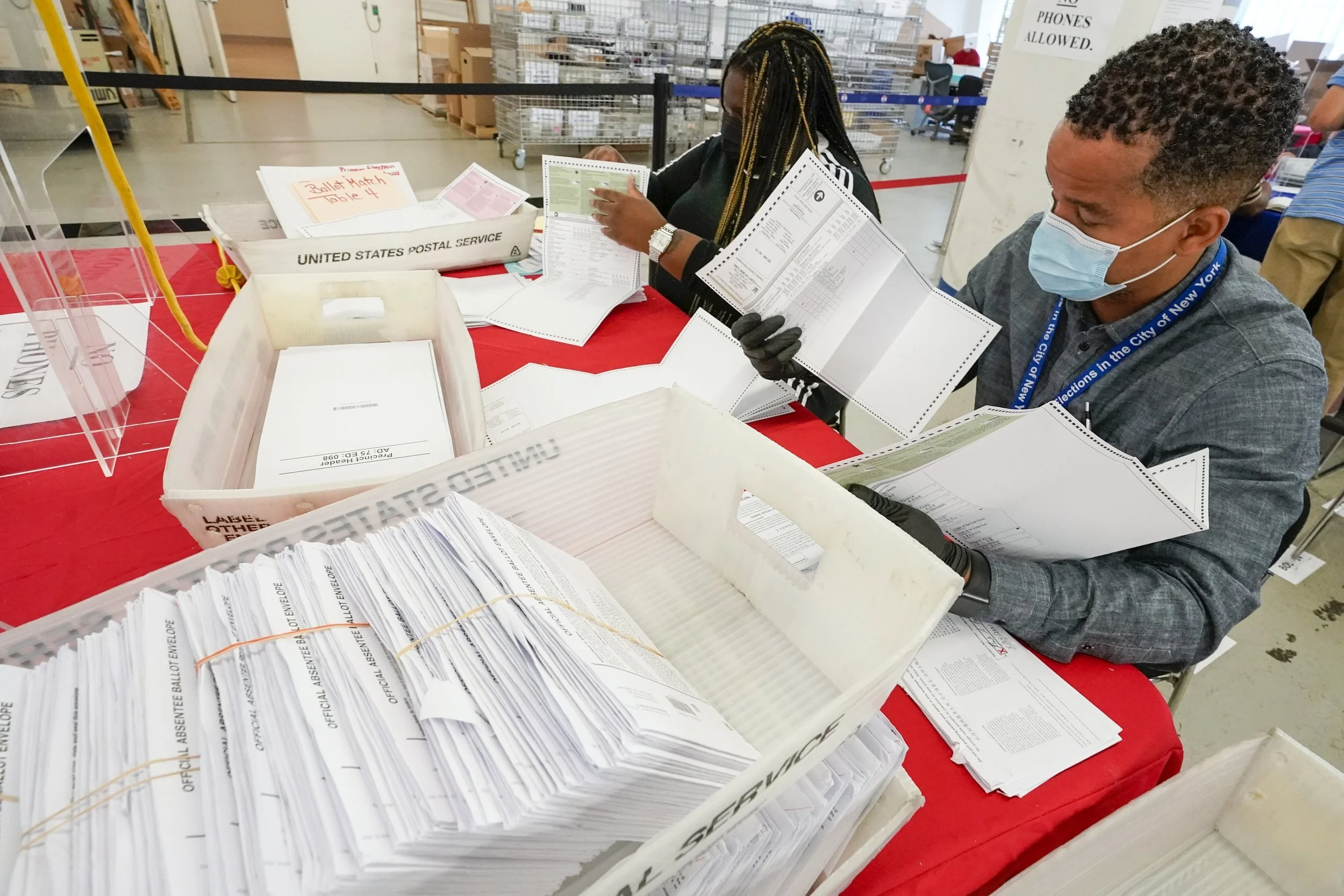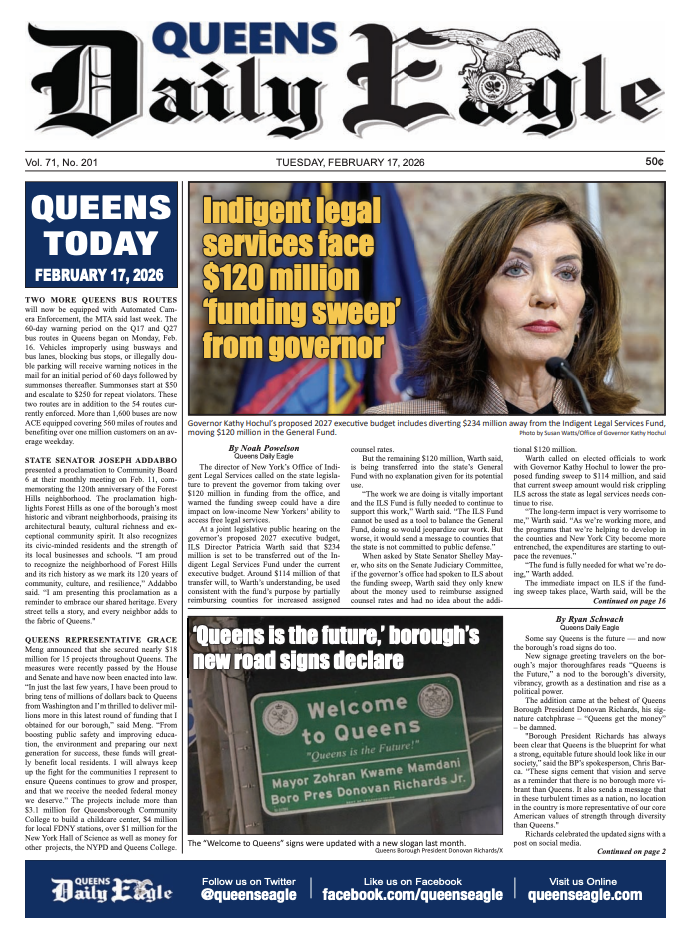GOP quickly sues state over Queens pol’s mail-in voting law
/Governor Kathy Hochul was sued by a group of Republican lawmakers and voters after signing a bill from Queens State Senator Michael Gianaris into law that aims to expand the option to vote early by mail on Wednesday, Sept. 20, 2023. Photo by Susan Watts/Office of Governor Kathy Hochul
By Jacob Kaye
That was fast.
It didn't take long for a group of New York Republicans to sue the governor and several others over legislation to expand New Yorkers’ ability to vote early by mail, which was signed into law on Wednesday.
Hours after Governor Kathy Hochul signed into law Queens State Senator Michael Gianairis’ legislation to make early voting by mail a universal option available to New Yorkers, a group of Republicans and conservatives asked a court to put an end to the law before it can even be enacted.
The lawsuit, brought by Reps. Elise Stefanik, Nicole Malliotakis, Nicholas Langworthy and Claudia Tenney, Assemblymember Andrew Goodell, Queens City Councilmember Robert Holden and several other elected Republicans and Republican groups, claims that the new law violates the state’s constitution, and that any change to absentee and mail-in voting must be done through a constitutional amendment. In 2021, a proposed constitutional amendment to expand the option to vote early by mail failed at the ballot box and was rejected by New Yorkers.
“The Mail-Voting Law was enacted by the Legislature in open and knowing defiance of [the constitution] ignoring and subverting the will of the people whom the Legislature is supposed to
represent,” the lawsuit, which was widely expected, reads. “Both the Mail-Voting Law enacted by the Legislature in 2023 and the proposed constitutional amendment rejected by the voters in 2021 advance the goal of allowing voters to vote by mail without having to declare any specific reason for doing so, but the rejected proposed constitutional amendment was the necessary legal prerequisite to any statutory change.”
“In passing the Mail-Voting Law, the Legislature has now contradicted what it acknowledged in 2021, and in a transparent effort to circumvent the will of the voters, it has resorted to semantics by simply renaming the measure the ‘Early Mail Voter Act’ instead of the ‘Authorizing No-Excuse Absentee Ballot Voting’ Amendment,” the lawsuit continued. “The Legislature has exalted form over substance.”
Gianaris, who introduced the bill in the Senate, slammed the Republicans who brought the suit in a statement on Wednesday.
“Unsurprisingly, this new law is being opposed by the usual suspects: Trump loyalists and insurrection apologists,” Gianaris said. “Their disdain for our democracy is well-established but we will not cede this critical ground to them as we continue to make it easier for people to vote and participate in choosing their government.”
Just hours before issuing his statement condemning the lawsuit, Gianaris was celebrating the bill’s signing – as well as the signing of several other voting bills – alongside Hochul and several fellow lawmakers at New York Law School.
“It should be a fundamental principle of democracy that the more people vote, the better it is,” Gianaris said. “The more eligible voters are participating in the process, the more they will be invested in their government, the more the government will reflect the actual will of the people that it represents.”
“And yet there are people who are seeking to increase their power by denying it to the average citizens of this country,” he added.
The legislation, which was passed in the Senate 42 to 21, aims to establish a system for early voting by mail – an option that is currently only allowed when a voter provides one of a set number of excuses as to why they cannot cast their ballot in person on election day.
Under the legislation, voters will be able to apply and request mail ballots up to ten days prior to an election. Voters must mail the ballots back to their local board of election no later than election day – the ballot must also be received by the local board no later than seven days after the election.
The legislation largely builds off of the expansions made to early mail in voting during the pandemic, when a number of New Yorkers were unable to or felt unsafe making their trips to the polls. However, that exemption has since expired.
Should the courts uphold the legislation, it will take effect at the start of 2024 and voters will be able to request early mailed ballots in special, primary and general elections.
The lawsuit filed by Republicans on Wednesday was largely expected – something Hohcul hinted at during the bill’s signing.
A group of New York Republicans challenged a new law that would expand the option to vote early by mail in special, primary and general elections beginning in 2024. AP file photo by Mary Altaffer
“We saw it work during the pandemic – we can do this,” the governor said. “Why not? What is so sinister, why would this be attacked? What's the problem with this? What are you afraid of? That's what you have to ask those who are going to try to stop this.”
In addition to the early mail-in voting bill, Hochul signed several other bills that aim to make it easier to vote in New York.
Among them was a bill that creates a “Golden Day,” when voters – on the first day of early voting – can register to vote and cast their ballots at their polling place on the same day.
Also signed into law a bill from Queens State Senator Leroy Comrie that requires the state’s Board of Elections to develop and provide a training program for poll workers.
“Our elections are vital to the continued participation in and success of our democracy,” Comrie said in a statement. “By adequately preparing poll workers statewide on how to best serve our vast and diverse population, we can reduce many of the common barriers faced on election day that might discourage New Yorkers from exercising their right to vote.”
“I am confident the addition of a statewide standard on training our nonpartisan poll workers through legislation passed by myself and Assemblymember Latrice Walker will achieve this,” he added.
The package of bills signed into law by Hochul on Wednesday also included legislation that requires local jails to provide voter registration information to detainees being released from correctional facilities. The bill was sponsored in the Assembly by Eddie Gibbs, the first formerly incarcerated man in the history of the state to serve in the legislature.
Currently, state prisons provide voting rights information to New Yorkers upon their release, but jails, including Rikers Island, do not.
“Formerly incarcerated people once released are confused as to their voting status,” Gibbs said on Wednesday. “This new law will require all local and county jails to provide notice of voting rights to people being released, so that they will know whether and when they are eligible to vote, how to register to vote, and have information about the mechanics and importance of voting.”





